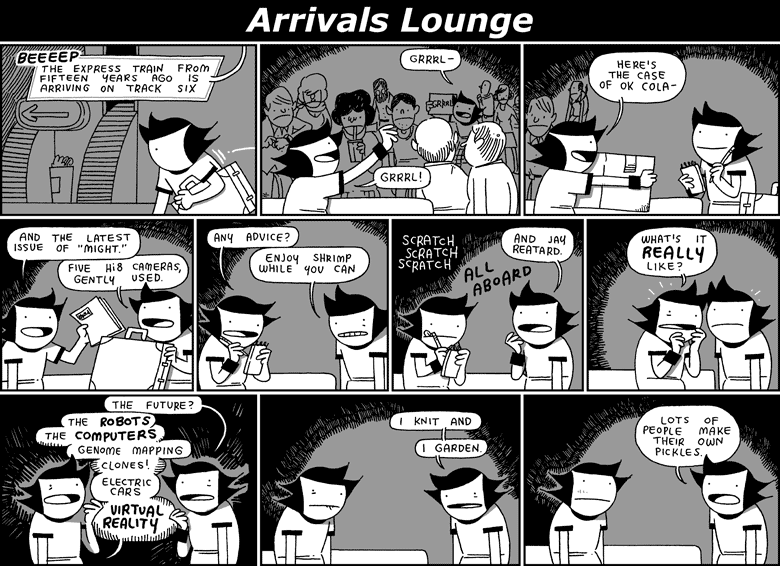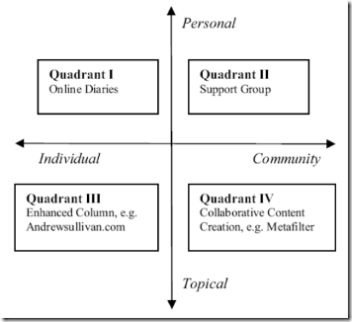In an effort to be more environmentally friendly, I am now recycling some of my previous writings from other online forums. In this case, I have here some constructive criticisms I offered to Thomas Hylland Eriksen about his working paper on the relationship between identity and cyberspace. I rather like what I wrote, so it seemed a shame just to keep it on the Media Anthropology Network’s servers. Plus I get to back up my stuff in case of fire or some sort of apocalypse. But, onwards:
My only substantive issue with the paper is the implied position that, were it not mostly for the transnationalizing efforts of migrants aided by the Internet’s technologies, the natural trajectory of the immigrant is towards assimilation. This does not address the active and institutionalized efforts at exclusion enacted by the nation-state and by many of its native-born population towards immigrants and their descendants. Often, this exclusion is based upon an ideology of race, upon the idea that immigrants and those born of immigrants are always already Other than the authentic indigenous population by virtue of being visibly different. I recall Lisa Lowe’s point that she is always an Asian American and never just American (Lowe 2003), or as James Clifford observed, with diasporas many times being the product of exclusion, the rise of a diasporic consciousness can be seen as making the best of a bad situation (Clifford 1997:257). In other words, diasporas are one of the consequences of the political ideology of race.
This ties into a broader point I want to make about nation-states and national identity. In many ways, nationalist ideology and racialized ideology are tied together, or at least are allied ideologies. Nation-states base their legitimacy in part on being the political manifestation of the nation, or being the nation writ large. The logic of nationalism demands that nation-states have homogenous populations, else the legitimacy of the state is called into question — if a nation-state rules because it is the representative of a people, what happens when other peoples exist within its territory? The empirical answer is that the nation-state suppresses these other nations, through direct and indirect violence (think of Native Americans in the former and African Americans and their economic and geographical segregation in the latter, but especially immigrant populations as well). If a nation-state’s people are essentially the same, then those not of the nation-state and its people are essentially different, essentially Other. This talk of essential difference, of course, is linked to the pseudo-scientific discourse of race, which supplies the essentialized categories necessary for many of nationalism’s constitutive fictions (in this way, I think Nazism is really nationalism taken to its logical extreme, but that is a digression).
Now then, what is really interesting is when one considers what nation-states are like today, in light of the new era of mass migration. Nation-states claim to represent the nation, but what happens to that notion when part of the nation exists outside the territory of the nation-state? As Thomas’ paper mentions, a nation-state can try to incorporate its diasporic members into its national and political imaginary, as in the case of Chile’s 14th region, and I will add the example of Haiti’s Tenth Department too. But wouldn’t the host country of those diasporic people object to the meddling of external actors in the host country’s territory? Shouldn’t the host country object, particularly because the new (or rediscovered) ideology of multiculturalism is already attempting to incorporate the otherness of migrants within the framework of the nation-state?
Here I will mention the results of the Canadian Ethnic Diversity Survey, which found that Filipinos in Canada scored highly both in their sense of belonging to their ethnic group and to Canada. They are loyal both to the Philippines and to Canada, in other words. I think this speaks to Sasskia Sassen’s observation that globalization, instead of weakening the nation-state, merely requires its rearticulation. David Graeber’s article on globalization being the re-emergence of older patterns of transnationalism is also interesting in this regard, particularly his point that today’s situation of an international elite in Europe using an international language mostly incomprehensible to the elite’s countrymen and living in cities with working class neigbourhoods composed of people drawn from around the Mediterranean echoes the situation in medieval Europe. My essential point is that what we might be observing is a new or reinvigorated transnational order, where members of a nation-state do not need to be exclusively loyal to that nation-state to be incorporated within it. So is race being decoupled from nation today? I think that race is actually still being deployed in the service of the nation-state, especially within the discourse of multiculturalism. It is, of course, an attempt to incorporate heterogeneity within a nation-state, or rather, an attempt at homogenizing heterogeneity. “Regardless of race or colour or creed, we’re all Canadian here,” is the message being promoted here in Canada. But multicultural discourse also obfuscates the differences between immigrants and already existing oppressed minorities (African Canadians and Natives in Canada’s case). It hides the historical oppression of minorities under the sameness of multiculturalism: Koreans are the same as Haitians, Ojibwa are the same as Poles, and the French are the same as Nigerians. So race still has political consequences even in the brave new multicultural world.
References:
Lowe, Lisa (2003). “Heterogeneity, hybridity, multiplicity: Marking Asian-American differences”. In Braziel, Jana Evans; & Mannur, Anita (eds.), Theorizing Diaspora: A Reader (pp. 132-159). Malden, MA: Blackwell Publishing Ltd.
Clifford, James (1997). “Diasporas”. In Clifford, James, Routes: Travel and Translation in the Late Twentieth Century (pp. 244-277). Cambridge MA: Harvard University Press.
Canadian Ethnic Diversity Survey
Statistics Canada
http://www.statcan.ca/english/freepub/89-593-XIE/89-593-XIE2003001.pdf
Now then, I’ll have to apologize but this only contains half of the information I referred to and does not have the data on Filipino’s sense of belongingness to Canada. I’m still in the process of tracking down the survey data. Actually I know where to look now thanks to my school’s librarians, but I still haven’t gotten around to getting the stuff.
Graeber, David (2002). “The anthropology of globalization (with notes on neomedievalism, and the end of the Chinese model of the nation-state).” American Anthropologist, 104(4):1222-1227.
Sassen, Sasskia (1998). Globalization and its discontents: essays on the new mobility of people and money. New York: The New Press.



